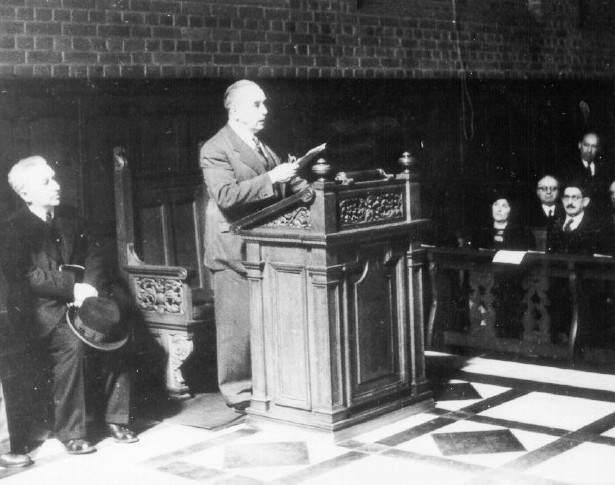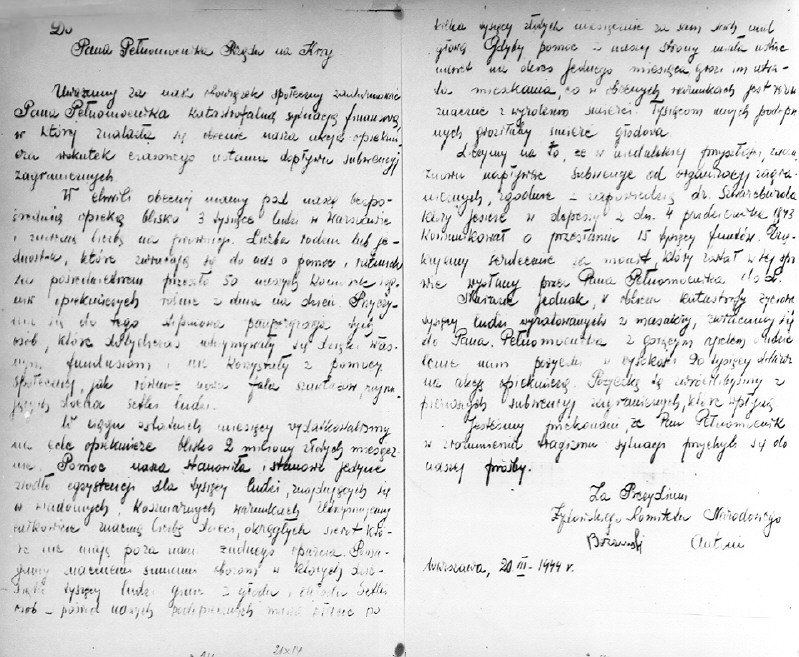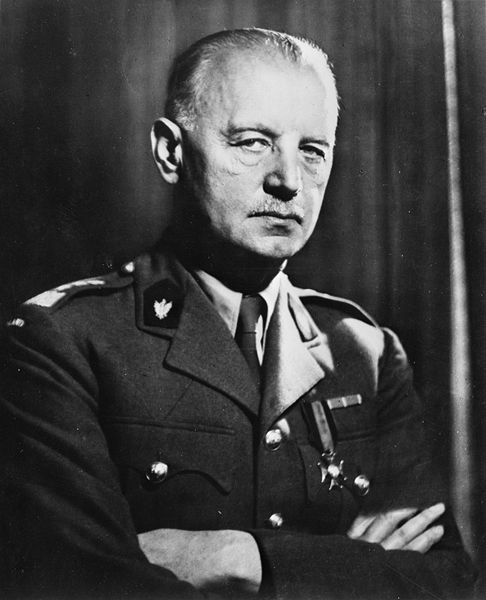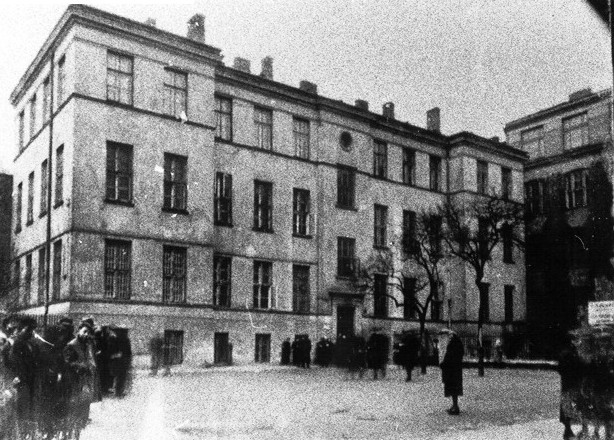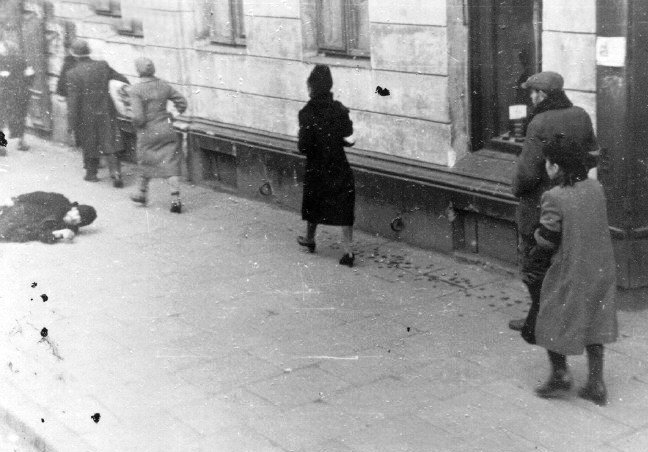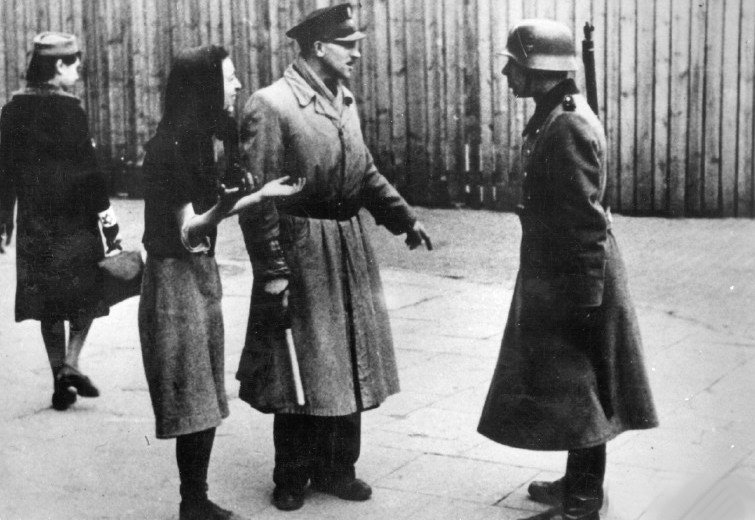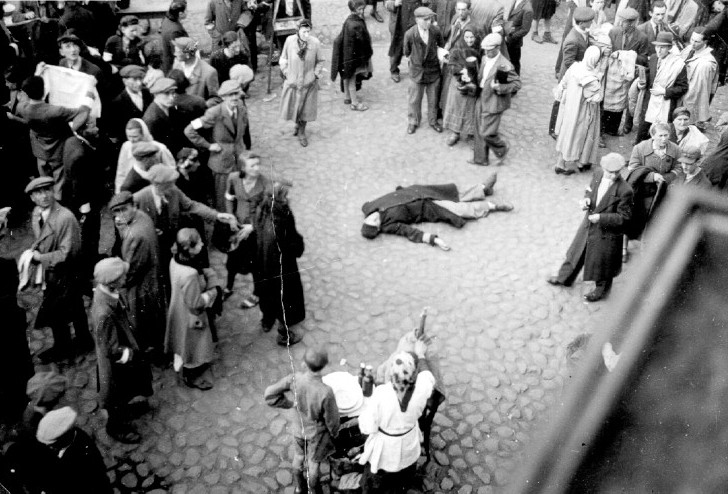Holocaust Education & Archive Research Team |
|
Survivor Stories
Holocaust Survivors Chelmno Survivors Righteous Gentiles Holocaust Recalled
| |||||
Jan Karksi Inside the Warsaw Ghetto (Interview with Jan Karski, photos added to enhance the text)
In the middle of 1942, I was thinking to take up again my position as a courier between the Polish underground and the Polish government in exile in London. The Jewish leaders in Warsaw learned about it. A meeting was arranged outside the ghetto. There were two gentlemen. They did not live in the ghetto. They introduced themselves – leader of Bund, Zionist leader.
Now, what transpired, what happened in our conversation?
First I was not prepared for it. I was relatively isolated in my work in Poland. I did not see many things. In thirty-five years after the war I do not go back. I have been a teacher for twenty-six years, I never mention the Jewish problem to my students. I understand this film is for historical record, so I will try to do it.
They described to me what is happening to the Jews. Did I know about it? No I didn’t.
They described to me first that the Jewish problem is unprecedented, cannot be compared with the Polish problem, or Russian, or any other problem. Hitler will lose this war, but he will exterminate all the Jewish population.
Do I understand it?
The Allies fight for their people – they fight for humanity. The Allies cannot forget that the Jews will be exterminated totally in Poland – Polish and European Jews.
They were breaking down. They paced the room. They were whispering. They were hissing. It was a nightmare for me.
Did they look completely despairing? Yes, Yes.
At various stages of the conversation they lost control of themselves. I just sat in my chair. I just listened. I did not even react. I didn’t ask them questions. I was just listening.
They wanted to convince you?
They realised, I think…. they realised from the beginning that I don’t know, that I don’t understand this problem. Once I said I will take messages from them, they wanted to inform me what is happening to the Jews. I didn’t know this. I was never in a ghetto. I never dealt with the Jewish matters.
Did you know yourself at the time that most of the Jews of Warsaw had already been killed?
I did know. But I didn’t see anything. I never heard any description of what was happening and I was never there. It is one thing to know statistics. There were hundreds of thousands of Poles also killed – of Russians, Serbs, Greeks.
We knew about it. But it was a question about statistics.
Did they insist on the complete uniqueness…..? Yes.
This was their problem: to impress upon me – and that was my mission – to impress upon all people whom I am going to see that the Jewish situation is unprecedented in history.
Egyptian pharaohs did not do it. The Babylonians did not do it. Now for the first time in history actually, they came to the conclusion: unless the Allies take some unprecedented steps, regardless of the outcome of the war, the Jews will be totally exterminated.
And they cannot accept it.
This means that they asked for very specific measures? Yes.
Interchangeably
At a certain point the Bund leader, then at a certain point the Zionist leader – then what do they want?
What message am I supposed to take? Then they gave me messages, various messages, to the Allied governments as such – I was to see as many government officials as I could, of course.
Then to the Polish government, then to the president of the Polish republic, then to the international Jewish leaders. And to individual political leaders, leading intellectuals- approach as many people as possible.
And then they gave me segments – to whom do I report what.
So now, in these nightmarish meetings – two meetings I had with them – well, then they presented their demands. Separate demands. The message was Hitler cannot be allowed to continue extermination.
Every day counts. The Allies cannot treat this war only from a purely military strategic standpoint. They will win the war, if they take such an attitude, but what good will it do to us?
We will not survive this war. The Allied governments cannot take such a stand. We contributed to humanity – we gave scientists for thousands of years. We originated great religions. We are humans. Do you understand it?
Do you understand it?
Never happened before in history, what is happening to our people now. Perhaps it will shake the conscience of the world. We understand we have no country of our own, we have no government, we have no voice in the Allied councils.
So we have to use services, little people like you are. Will you do it? Will you approach them? Will you fulfil your mission? Approach the Allied leaders?
We want an official declaration of the Allied nations that in addition to the military strategy which aims at securing victory, military victory in this war, extermination of the Jews forms a separate chapter, and the Allied nations formally, publicly, announce that they will deal with this problem, that it becomes part of their overall strategy in the war.
Not only defeat of Germany, but also saving the remaining Jewish population. Once they make such an official declaration, they have an air force, they drop bombs on Germany – why cannot they drop millions of leaflets informing the German population exactly what their government is doing to the Jews?
Perhaps they don’t know it!
Now let them make an official declaration- again , official, a public declaration – that if the German nation does not offer evidence of trying to change the policy of their government, the German nation will have to be held responsible for the crimes their government is committing.
And now, if there is no such evidence, to announce publicly, officially, certain objects in Germany will be bombed, destroyed, as a retaliation for what the German government is doing against the Jews, that the bombing which will take place is not a part of the military strategy. It deals only with the Jewish problem. Let the German people know before bombing takes place and after bombing takes place that this was done and will continue to be done because the Jews are being exterminated in Poland.
Perhaps it will help. They can do it. They can do it. This was one mission. Next, both of them – particularly the Zionist leader – he was again whispering, hissing. Something is going to happen. The Jews in the Warsaw ghetto are talking about it, particularly the young elements.
They will fight. They speak about a declaration of war against the Third Reich. A unique war in world history - Never such a war took place. They want to die fighting.
We can’t deny them this kind of death. By the way, I don’t know at the time, a Jewish military organisation emerged. They didn’t tell me about it, only that something is going to happen. The Jews will fight. They need arms. We approached the commander of the Home Army, the underground movement in Poland.
Those arms were denied the Jews. They can’t be denied arms, if such arms exist, and we know you have arms. This message for the commander in chief General Silkorski, to issue orders that those arms will be given to the Jews.
This was another part of the mission. There are international Jewish leaders. Reach as many as possible, tell them this. They are Jewish leaders. Their people are dying. There will be no Jews so what for do we need leaders?
We are going to die as well. We don’t try to escape. We stay here. Let them go to important offices in London, wherever they are. Let them demand for action. If they refuse, let them walk out, stay in the street, refuse food, refuse drink. Let them die in view of all humanity. Who knows? Perhaps it will shake the conscience of the world.
Between those two Jewish leaders – somehow this belongs to human relations – I took, so to say, to the Bund leader, probably because of his behaviour – he looked like a Polish nobleman, a gentleman, with straight beautiful gestures, dignified.
I believe that he liked me also, personally. Now at a certain point, he said “Mr Witold, I know the western world. You are going to deal with the English. Now you will give them your oral reports.
I am sure it will strengthen your report if you will be able to say, “I saw it myself.” We can organise for you to visit the Jewish ghetto. Would you do it? If you do I will go with you to the Jewish ghetto in Warsaw so I will be sure you will be as safe as possible.
A few days later we established contact. By that time the Jewish ghetto as it existed in 1942 until July did not exist anymore. Out of approximately four hundred thousand Jews, some three hundred thousand were already deported from the ghetto.
So within the outside walls practically there were some four units. The most important was the so-called central ghetto. They were separated by some areas inhabited by the Aryans and already some areas not inhabited by anybody.
There was a building. This building was constructed in such a way that the wall which separated the ghetto from the outside world was a part of the back of the building, so the front was facing the Aryan area. There was a tunnel.
We went through this tunnel without any kind of difficulty. What struck me was that now he was a completely different man – the Bund leader, the Polish nobleman.
I go with him. He is broken down, like a Jew from the ghetto, as if he had lived there all the time. Apparently, this was his nature. This was his world. So we walked the streets. He was on my left. We didn’t talk very much. He led me.
Well, so what? So now comes the description of it, yes?
Well…. naked bodies on the street. I ask him, “Why are they here?” The corpses you mean?
Corpses... He says, “Well they have a problem. If a Jew dies and the family wants a burial, they have to pay tax on it. So they just throw them in the street.
Because they cannot pay the tax? Yes.
They cannot afford it. So then he says: “Every rag counts. So they take their clothing. And then once the body, the corpse is on the street, the Judenrat has to take care of it.”
Women with their babies, publicly feeding their babies but they have no …. no breast, just flat. Babies with crazed eyes, looking……..
Did it look like a completely strange world? Another world, I mean? It was not a world. There was not humanity. Streets full, full.
Apparently all of them lived in the street, exchanging what was the most important, everybody offering something to sell – three onions, two onions, some cookies. Selling. Begging each other crying and hungry.
Those horrible children- some children running by themselves or with their mothers sitting. It wasn’t humanity…. it was some …. some hell.
Now in this part of the ghetto, the central ghetto, there were German officers. If the Gestapo released somebody, the Gestapo officers had to pass through the ghetto to get out of it.
There were also Germans, German traffic. Now the Germans in uniform, they were walking…. silence! Everybody frozen until he passed, no movement , no begging, nothing.
Germans …. contempt - this is apparent that they are subhuman. They are not human. Now at a certain point some movement starts. Jews are running from the street I was on. We jumped into a house. He just hits the door. “Open the door! Open the door!”
They open the door. We move in. Windows give onto the back of the street. We go to the opposite – in the door. Some woman opens the door. He says: “All right, all right, don’t be afraid, we are Jews.”
He pushes me to the window, says “Look at it, look at it.” There were two boys, nice looking boys, Hitler-jugend in uniform. They walked. Every step they made, Jews disappearing, running away.
They were talking to each other. At a certain point a boy goes into his pocket without even thinking. Shoots !
Some broken glass, the other boy congratulating him, they go back. So I was paralysed.
So then the Jewish woman- probably she recognised me, I don’t know, that I am not a Jew – she embraced me. “Go, go, it doesn’t do you any good, go, go.”
So we left the house. Then we left the ghetto. So then he said, “You didn’t see everything, you didn’t see too much. Would you like to go again? I will come with you. I want you to see everything.” “I will.”
Next day we went again. The same house, the same way. So then again I was more conditioned. So I felt other things. Stench, stench, dirt, stench – everywhere suffocating.
Dirty streets, nervousness, tension. Bedlam. This was Platz Muranowski. In a corner of it some children were playing something with rags – throwing the rags to one another.
He says: “They are playing, you see. Life goes on. Life goes on.” So then I said: “They are simulating playing. They don’t play.” It was a special place for playing?
In the corner of Platz Muranowski – no, no,no, open. So I say: “They are…”
There are trees?
There were a few trees, rickety. So then we just walked the streets, we didn’t talk to anybody. We walked probably one hour. Sometimes he would tell me: “Look at this Jew” – a Jew standing without moving. I said: “Is he dead?”
He says: “No, no, no, he is alive Mr Witold, remember – he’s dying, he’s dying. Look at him. Tell them over there. You saw it. Don’t forget.”
We walk again. It’s macabre. Only from time to time he would whisper: “Remember this, remember this.” Or he would tell me: “Look at her.” Very many cases I would say: “What are they doing here?” His answer: “They are dying that’s all. They are dying.”
And always: “But remember, remember.”
We spent more time, perhaps one hour. We left the ghetto. Frankly I couldn’t take it anymore, “Get me out of it.” And then I never saw him again. I was sick. Even now I don’t want ….. I understand your role. I am here. I don’t go back in my memory, I couldn’t tell any more.
But I reported what I saw. It was not a world. It was not part of it. I did not belong there. I never saw such things, I never….. nobody wrote about this kind of reality.
I never saw any theatre, I never saw any movie…. this was not the world. I was told that these were human beings – they didn’t look like human beings.
Then we left. He embraced me then. “Good luck, good luck.”
I never saw him again.
Source:
Shoah – An Oral History of the Holocaust Holocaust Historical Society MATERIAL TOWARDS A DOCUMENTARY HISTORY OF THE FALL OF EASTERN EUROPE JAN KARSKI
Copyright. Carl Evans H.E.A.R.T 2008
|
